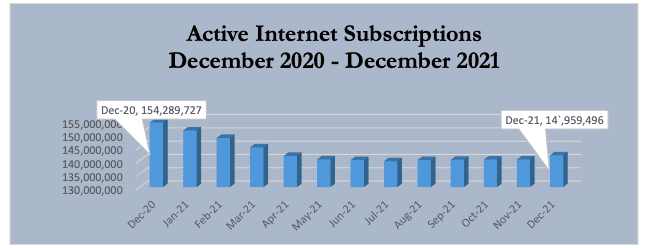Reports released by the Nigerian Communications Commission (NCC) reveal that Nigerians, as well as foreigners residing in Nigeria in 2021, consumed 353,118.89 terabytes of data. This amount of data was reported to have been consumed between January and December 2021. This huge figure represents “an increase of 68.2% in data consumption” despite an 8% decline in internet subscriptions when compared with the figures from the year 2020. This figure comes from a new report released by the Commission on the information on subscribers/network data for 2021.

Between the months of January – December 2020, data consumption in the country was reported at 209,917.40 terabytes of data. In December 2020, when the commission directed all GSM Operators in Nigeria not to sell or register new SIMs, SIM Swaps, or perform any form of porting activities, internet subscriptions decreased from 154.3 Million as of December 2020, to 141.9 Million as of December 2021. This, therefore, gave room for an increase in the volume of data consumption by the subscribers, this, however, covered the network operators in terms of revenue. This is reflected in the 2021 financial results of two of the leading network operators, MTN and Airtel, which showed a surge in earnings from data.

MTN reported a 55% increase at ₦516 billion in data revenue for the year in internet customers. Airtel Nigeria also reported an increase of 41.1% at ₦304 billion in data revenue for the year. These two operators attributed this growth to the expansion of 4G across the country, this became the driving force for the increase in data usage by their customers
Highlights from the NCC 2021 Subscriber/Network Data Annual Report
According to NCC’s report, the total number of subscribers decreased from about 204,601,313 in December 2020 to about 195,463,898 active voice subscriptions by December 2021. A loss of 9,137,415 subscriptions was reported which represents about 4.46% decline in total subscriptions within the period under consideration. The decrease in subscriber number was as a result of NCC’s directive in December 2020 which required all GSM Operators to suspend the sale and registration of new SIMs, SIM swaps and all porting activities. The commission’s reason for this was to conduct an audit on all operators to check the quality standards and requirements of SIM Card Registration as issued by the Federal Ministry of Communications and Digital Economy and the Commission.
Within the same year in consideration, Broadband Penetration decreased from 45.02% as of December 2020 to 40.88% as of December 2021. Similarly, Broadband Subscriptions declined from 85,941,222 to 78,041,883. According to NCC, foreign direct investment into the telecoms industry was $417.48m in 2021.Nigeria’s teledensity decreased from 107.18% as of December 2020 to 102.40% by December 31st 2021.
Stakeholders reaction
In an interview with Punch on the increase in the usage of telecom, Adeolu Olu Ogunbanjo, President, National Association of Telecoms Subscribers said, “The year 2020 was the real COVID-19 period and people were trying to graduate online. 2021 was a full blast in online activity. Online work saw an increase in commercial and economic transactions. This was all due to the telecoms infrastructure. This was the right thing to do. As people used their computers online, 2021 saw an increase in online activities” Ogunbanjo added that, “Data usage and calls increased. Growth could slow down in 2022, as 70 million subscribers are not able to make calls. Perhaps data, yes. But the implementation of the SIM-NIN policy will have its effect.”
The Chief Operating Officer of the Association of Telecommunications Companies of Nigeria, Ajibola Olude, mentioned that “there are many factors that are responsible for the increase in the usage of telecom services, one of them is that productivity is now driven by telecom services. Olude said “If you go to any sector today, their growth, their productivity is driven by telecom services. This includes banking, insurance, and hospitality. Telecoms has shown its ability to reach all segments of the economy. This growth is expected in 2022 due to the anticipated increase in the adoption of telecom services.”
Why do Nigerians consume more data?
Data users who fall within the demography of teenagers and young adults, secondary school students, undergraduates, post-graduates and high-income households are considered the ones who use the most data. The reason for this is that they all depend on data usage to carry out formal and informal functions.
The proportion of Nigerians with high-speed broadband service at home increased rapidly in 2020 because a lot of users have seen the Internet as a required necessity to save the day. More young people now depend on the Internet for daily income.
Another factor contributing to more data usage amongst Nigerians is that as more people continue to purchase and own smartphones, computers, tablets, and security cameras that run on data, sage will be high. Other contributing factors include automatic app syncing and updating to the cloud, consumption of video content, music streaming, and downloading movies to name a few.















